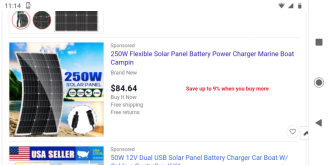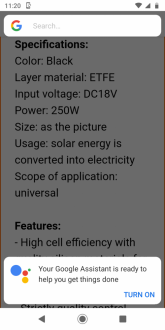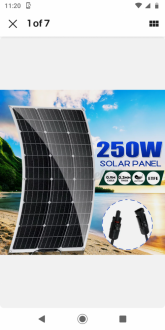You are using an out of date browser. It may not display this or other websites correctly.
You should upgrade or use an alternative browser.
You should upgrade or use an alternative browser.
Are these flexible solar panels junk and which is better rigid or flexible
- Thread starter Kike12
- Start date
Ok thank youJunk after about 2 years... You need to go rigid for sure.
schmism
Solar Addict
for a 250w panel i would not consider a flexable in that size. If you wanted a couple of 100 watt ones for a hand portable kit perhaps flexable, otherwise rigid ftw
rin67630
Solar Enthusiast
Anything but glass is junk.
That panel is Not 250 watts with 18 cells.Are these flexible solar panels junk and which is better rigid or flexible panels
You dont provide specs or size.
The $85 price is too low for a 250 watt panel.
They are lying as it is too small.
My guess is its an 80 watt panel.
Last edited:
rin67630
Solar Enthusiast
My guess is that a dot is missing: it's a 25.0 W panel.That panel is Not 250 watts with 18 cells.
You dont provide specs or size.
The $85 price is too low for a 250 watt panel.
They are lying as it is too small.
My guess is its an 80 watt panel.
Last edited:
Not a chance in hell that is 250W..
What is "these panels" that you are referring to?I know I am late to the party, but has anyone actually tested these panels or their brethren?
Did you read this thread as it is about Fake wattage flexible panels foolishly bought from Wish.
Mark44
Retired Traveler with a yen for solar and LIFEPO4
The first post on this thread has several attachments showing flexible panels. Has anyone on this list actually tested them, or are all of the "they are crap" comments merely from observation of the ads? I do not see anyone here giving direct evidence of their "crappiness" or otherwise. I would like some empirical evidence before I can make any kind of decision regarding the soundness of such products. That is why I asked.What is "these panels" that you are referring to?
Did you read this thread as it is about Fake wattage flexible panels foolishly bought from Wish.
Yes I did read all of the posts, as well as taking note of the title of the thread. Did you read the thread before replying as you did?
I do not see anyone saying they ordered these from WISH, or anywhere else. Am I missing something? You seem awfully imperious in your reply, did I perhaps touch a nerve by asking for specifics?
In my opinion (and I have used ALL of these types):
- Rigid panels, with topsheets of shock-resistant glass, are by far the best. Lifespan maybe 20-30 years, unless catastrophic impact damage occurs. (These are generally replaced by newer and more efficient panels for efficiency reasons, and not because they actually wore out.)
- Newer Technology "shingled panels are second best. I have an EXPECTANCY for lifespan of 6-12 years on RVs, (not enough experience yet, because they are far too new - although none of the panels which I have installed has yet failed). They're superior to other "semi-flexible" types because the plastic top sheets vary in thickness from extremely thick (in the "valleys" between cell edges") down to a pretty thick "moderately thick" at the ridges of cell edges. The shingled cells also provide great additional strength between cells and resistance to cracking between adjacent cells where they are shingled on top of each other. HOWEVER, the quality of lower sheet wiring is not necessary any better than a traditional thin panel - this is where a frequently bending mounting surface or improper mounting might allow them to die younger.
- In my limited experience, old-style CIGS panels have had an advantage in lifespan advantage over old-style multi-celled panels. 3-8 years, depending on the mounting surface. (I always work on RV and Trailer roofs, they are ALL somewhat unstable and flexible.)
- At the very bottom in expected lifespan, multi-celled thin-silicone panels. The cells themselves are THIN and WEAK, highly prone to cracking microscopically and macroscopically (taking an out an entire diode string when one dies completely.) The top sheet is always done thin and cheap, with very limited strength - doing virtually nothing for the cells underneath. The bottom wiring is less reliable than shingled cell designs, and with weak structure above - this is where they usually die. They get only about 2-4 years average lifespan on an RV, depending on the stability of the mounting surface and relative quality of the panels.
Last edited:
Mark44
Retired Traveler with a yen for solar and LIFEPO4
Thank you so much for this reply. While I understand that you are going from your own experience, I really appreciate the forthright in detailed answer you provided.In my opinion (and I have used ALL of these types):
Slightly thicker is almost always better. Even without considering the vastly inflated watts (which are impossible with the surface area of that panel, and its small number of cells) - this super thin "old-style" non-shingled panel is about as bad a choice as its possible to buy. "PTFE" might sound nice, but at a TOTAL thickness of only .3 mm, there's only about 1/3 as much thickness as i currently want to use (with shingled panels). Thickness makes strength, and the "shingled" cell layout makes them even stronger than the nominal thickness.
- Rigid panels, with topsheets of shock-resistant glass, are by far the best. Lifespan maybe 20-30 years, unless catastrophic impact damage occurs. (These are generally replaced by newer and more efficient panels for efficiency reasons, and not because they actually wore out.)
- Newer Technology "shingled panels are second best. I have an EXPECTANCY for lifespan of 6-12 years on RVs, (not enough experience yet, because they are far too new - although none of the panels which I have installed has yet failed). They're superior to other "semi-flexible" types because the plastic top sheets vary in thickness from extremely thick (in the "valleys" between cell edges") down to a pretty thick "moderately thick" at the ridges of cell edges. The shingled cells also provide great additional strength between cells and resistance to cracking between adjacent cells where they are shingled on top of each other. HOWEVER, the quality of lower sheet wiring is not necessary any better than a traditional thin panel - this is where a frequently bending mounting surface or improper mounting might allow them to die younger.
- In my limited experience, old-style CIGS panels have had an advantage in lifespan advantage over old-style multi-celled panels. 3-8 years, depending on the mounting surface. (I always work on RV and Trailer roofs, they are ALL somewhat unstable and flexible.)
- At the very bottom in expected lifespan, multi-celled thin-silicone panels. The cells themselves are THIN and WEAK, highly prone to cracking microscopically and macroscopically (taking an out an entire diode string when one dies completely.) The top sheet is always done thin and cheap, with very limited strength - doing virtually nothing for the cells underneath. The bottom wiring is less reliable than shingled cell designs, and with weak structure above - this is where they usually die. They get only about 2-4 years average lifespan on an RV, depending on the stability of the mounting surface and relative quality of the panels.
As someone without the level of experience others such as yourself possess, it is difficult to analyze these offerings when people simply respond "ridiculous" or "stupid" or other epithets without an providing any details.
Again thanks for an enlightening answer with valuable information that others can use in their analysis! ??
Similar threads
- Replies
- 5
- Views
- 199
- Replies
- 9
- Views
- 744
- Replies
- 5
- Views
- 183
- Replies
- 6
- Views
- 535
- Replies
- 2
- Views
- 221





